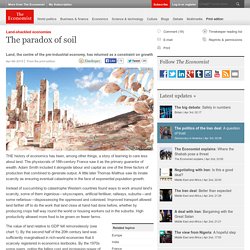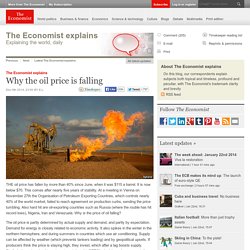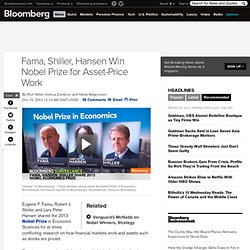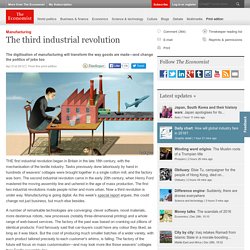

Explicit cookie consent. Explicit cookie consent. THE history of economics has been, among other things, a story of learning to care less about land.

The physiocrats of 18th-century France saw it as the primary guarantor of wealth. Adam Smith included it alongside labour and capital as one of the three factors of production that combined to generate output. A little later Thomas Malthus saw its innate scarcity as ensuring eventual catastrophe in the face of exponential population growth.
Instead of succumbing to catastrophe Western countries found ways to work around land’s scarcity, some of them ingenious—skyscrapers, artificial fertiliser, railways, suburbs—and some nefarious—dispossessing the oppressed and colonised. Improved transport allowed land farther off to do the work that land close at hand had done before, whether by producing crops half way round the world or housing workers out in the suburbs. The value of land relative to GDP fell remorselessly (see chart 1). Instead, concern over land has come roaring back. Explicit cookie consent. THE oil price has fallen by more than 40% since June, when it was $115 a barrel.

It is now below $70. This comes after nearly five years of stability. At a meeting in Vienna on November 27th the Organisation of Petroleum Exporting Countries, which controls nearly 40% of the world market, failed to reach agreement on production curbs, sending the price tumbling. Also hard hit are oil-exporting countries such as Russia (where the rouble has hit record lows), Nigeria, Iran and Venezuela. Why is the price of oil falling? The oil price is partly determined by actual supply and demand, and partly by expectation.
Four things are now affecting the picture. Daily chart: Crowning the dragon. How High-Frequency Stock Trader Quantlab Guarded Its Algorithms. Michael_Porter_Creating_Shared_Value. Big Data Revolution. The data of Davos: Who’s on the Magic Mountain? Fama, Shiller, Hansen Win 2013 Nobel Prize in Economics. Eugene F.

Fama, Robert J. Shiller and Lars Peter Hansen shared the 2013 Nobel Prize in Economic Sciences for at times conflicting research on how financial markets work and assets such as stocks are priced. The three economists, all Americans, “laid the foundation for the current understanding of asset prices,” the Royal Swedish Academy of Sciences, which selects the winner, said today in Stockholm. “It relies in part on fluctuations in risk and risk attitudes, and in part on behavioral biases and market frictions.” Their work spans almost 50 years of research, beginning with the finding by the University of Chicago’s Fama that it’s difficult to predict price movements in the short run.
Later papers by Shiller and the University of Chicago’s Hansen focused on longer-run price swings and the extent to which they could be explained by such fundamental features as dividend payouts on stocks and the risk appetite of investors. Close Open Photographer: TT/Claudio Bresciani/AP Photo Robert J. World's Happiest Countries: Australia Tops OECD Better Life Index. People all over the world are fascinated by happiness rankings and how their own countries fare in global league tables.

In some places, such as Britain, ratings of national well-being aren't just a matter for policy wonks but a subject of widespread popular interest. The Paris-based Organization for Economic Cooperation and Development (OECD) is the latest institution to jump into the happiness-rating business with its new Better Life Initiative, a detailed survey of 24 indicators in 11 categories--ranging from civic engagement to environmental quality--across its 34 member states plus Brazil and Russia.
When all of the categories are weighted equally, the top-performing country in the world is Australia, cited for its strong community spirit and high level of life satisfaction. The lowest-ranked country among those studied was Turkey, whose weak scores on the same two criteria dragged it below Mexico, Chile, and Brazil. Read on for an introduction to the world's happiest countries.
Manufacturing: The third industrial revolution. THE first industrial revolution began in Britain in the late 18th century, with the mechanisation of the textile industry.

Tasks previously done laboriously by hand in hundreds of weavers' cottages were brought together in a single cotton mill, and the factory was born. The second industrial revolution came in the early 20th century, when Henry Ford mastered the moving assembly line and ushered in the age of mass production. The first two industrial revolutions made people richer and more urban. Now a third revolution is under way. Manufacturing is going digital. A number of remarkable technologies are converging: clever software, novel materials, more dexterous robots, new processes (notably three-dimensional printing) and a whole range of web-based services.
Towards a third dimension The old way of making things involved taking lots of parts and screwing or welding them together. The applications of 3D printing are especially mind-boggling. Other changes are nearly as momentous. Daily chart: The maths behind the madness. FREE Logo Maker - FREE Logo Creator - FREE Online Logo Design. Daily chart: Winners and losers. Daily chart: Growth in 2012.